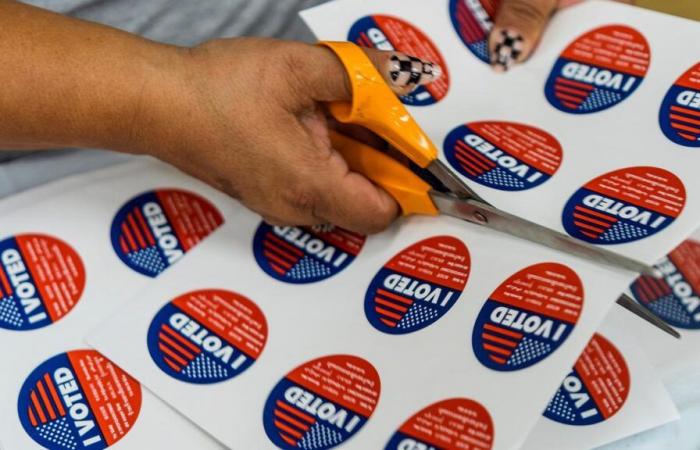background
As of: November 6th, 2024 12:48 a.m
In the USA, elections are not held directly, but rather through voters in the Electoral College. Unfair, many say – after all, this doesn't necessarily mean that the person with the most votes will get into the White House.
Shannon Dugan from a rural suburb of Phildalephia has only one word for America's Electoral College: “Unfair!” says the 48-year-old housewife from West Bradford at the fall festival. “It shouldn't be like that!”, and financial advisor Steven adds: “Should ten people here in the country count more than ten city dwellers? Do my worries count more? I don't think so. We should all be equal. But that's not who we are. “
Shannon and Steven are essentially among the beneficiaries of the system that was enshrined in the US Constitution 237 years ago. Because they live in Pennsylvania, one of the so-called swing states, their votes are crucial.
The size of the country
“The process today is different than what the founding fathers imagined back then,” says Robert Alexander, almost apologetically. The political scientist from Bowling Green State University in Ohio is an expert on the Electoral College.
Because the country was so large and the flow of information was rather limited in the late 18th century, the framers of the Constitution opted for a representative democracy: the president should not be elected directly, but by voters in the individual states.
Each state received as many electors as it has representatives in the House of Representatives. Plus two more, regardless of population or size. A compromise, even back then, explains Alexander.
This meant that states with fewer people were better represented. And that made things more palatable to these more rural states. To even get them to agree to the electorate process.
Wafer-thin majorities decide
The formula still applies today. With the effect that an “elector” in sparsely populated Wyoming now represents 150,000 voters. In California, on the other hand, half a million. “That is one of the main criticisms, to this day,” explains Alexander. “Because it just means that one person doesn't have one vote.”
In addition, the “winner takes it all” principle applies in almost all states: the candidate who receives the most votes gets all the electoral votes. No matter how close the result is. This is how the so-called swing states become so important: Because sometimes Republicans and sometimes Democrats win by the narrowest of margins, the billion-dollar election campaign focuses almost exclusively on these seven states.
According to surveys, the majority of Americans find this system outdated and undemocratic. Nevertheless, political scientist Alexander believes that little will change. Reforming the Electoral College would require amending the Constitution with a two-thirds majority in Congress. An almost insurmountable hurdle.
Hardly any change in sight
Even to abolish the “winner takes it all” principle, there is a lack of political will. Because if electoral votes were distributed proportionally or depending on the majority in individual electoral districts, third parties would suddenly have a greater chance.
But in the existing two-party system, neither Democrats nor Republicans have any interest in that: “The two parties will look at it and say: 'Hmm, maybe this will just lead to more candidates from other parties? Is that just going to hurt us?'” said Alexander. “And that's why nothing is likely to change.”
Four years ago, the electoral system was subjected to a stress test that America's democracy almost did not survive: Donald Trump put pressure on the Republicans in the state parliaments of Pennsylvania, Wisconsin and Michigan to simply appoint their own electors. Although Joe Biden received the most votes in these states and the Democrats therefore had this right.
And in Congress, Trump's followers tried to prevent the certification of Biden's election. For the first time in over 200 years, a law regulating this final part of the electoral process was subsequently tightened. But political scientist Alexander remains skeptical:
“We can only guess whether that is enough. I would never have expected what happened on January 6, 2021 and how far things went back then,” says the political scientist. “I'm no longer ruling anything out when it comes to our presidential election.”
Julia Kastein, ARD Washington, tagesschau, November 5th, 2024 10:46 a.m






